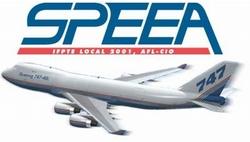Four-Year Deals Approved By Largest Turnout In Recent
History
 Following many months of labor strife, tense negotiations and
strikes both threatened and realized, Boeing appears to be nearing
the end of its latest bruising round of contract negotiations with
its unions. On Monday, engineering and technical employees
represented by the Society of Professional Engineering Employees in
Aerospace (SPEEA) IFPTE Local 2001 ratified four-year collective
bargaining agreements covering nearly 21,000 Boeing employees in
Washington, Oregon, California and Utah.
Following many months of labor strife, tense negotiations and
strikes both threatened and realized, Boeing appears to be nearing
the end of its latest bruising round of contract negotiations with
its unions. On Monday, engineering and technical employees
represented by the Society of Professional Engineering Employees in
Aerospace (SPEEA) IFPTE Local 2001 ratified four-year collective
bargaining agreements covering nearly 21,000 Boeing employees in
Washington, Oregon, California and Utah.
SPEEA announced the result Tuesday following a vote-by-mail
process. Boeing and SPEEA leaders agreed November 14 on the terms
of the contracts. The first covers 14,000 engineers in the SPEEA
Professional Bargaining Unit. The second contract covers 7,000
technical workers in the union's Technical Bargaining Unit. The
contracts go into effect December 2, 2008, and expire October 6,
2012.
"These contracts reward our employees for the valuable
contributions they make to Boeing's success," said Doug Kight,
Boeing vice president of Human Resources. "These agreements also
enable us to remain competitive and position Boeing to continue to
win new business during these challenging economic times."
SPEEA notes the vote turnout was one of the largest ballot
returns in union history. Votes were counted Monday at union
headquarters in Seattle.
The final tally in the mail-in vote showed 69 percent of the
voting employees in the SPEEA Technical Unit approved their
contract offer with 3,429 voting to accept and 1,554 voting to
reject. In the separate Professional Unit, 79 percent approved the
offers with 7,184 voting to accept the offer and 1,951 voting to
reject. Union negotiation teams recommended members approve the
offers.
Nearly 74 percent of the eligible members voted on the
contracts. In 2005, just 65 percent of the members voted.
"Passage of these contracts represents a first step in restoring
the relationship between Boeing management and its engineering and
technical workforce," said SPEEA Executive Director and Chief
Spokesperson Ray Goforth. "We have a lot of work to breathe life
into the text of these agreements and we still need to finish
negotiations in Wichita."
Goforth refers to negotiations for 700 engineers at Boeing
Wichita, which are scheduled to resume Tuesday. The Wichita
contract was extended to allow for negotiations beyond the original
December 5 expiration.
 The new contracts provide employees
wage increases, benefit improvements, a voice in future decisions
on outsourcing and a process to take a voluntary layoff with
benefits. The union spent more than eight months negotiating the
offers with Boeing. Final main table negotiations started October
29.
The new contracts provide employees
wage increases, benefit improvements, a voice in future decisions
on outsourcing and a process to take a voluntary layoff with
benefits. The union spent more than eight months negotiating the
offers with Boeing. Final main table negotiations started October
29.
Specifically, the contracts approved Monday provide salary
increase pools of 5 percent in each year of the contract. Engineers
in the Professional unit are guaranteed an increase of at least 2
percent each year and Technical workers are guaranteed increases of
at least 2.5 percent during each year of the contract.
In addition to the wage increases, the union says improvements
were gained to medical coverage, retirement and the company agreed
to maintain the defined benefit pension for new employees. SPEEA
also stopped Boeing from cutting engineers in Utah from the
Professional contract.
While recommended, passage was not guaranteed. During more than
100 workplace meetings, union negotiators heard members talk about
the continued lack of respect from management and concerns about a
lack of confidence in Boeing corporate leaders.
"These were the toughest negotiations I've been involved with,"
said Professional Negotiation Team chair and three-time negotiator
Dave Patzwald.
Union leaders said members voiced concerns about management
misdirection and lack of respect for employees for months. The
comments grew out of frustration over corporate decisions that are
causing continued delays to the 787 and 747-8, fastener problems on
multiple aircraft and a continued push to hire more contract labor
while pushing existing employees to work more and more
overtime.
 Senator Pushes FAA to Accelerate Rocket Launch Licensing
Senator Pushes FAA to Accelerate Rocket Launch Licensing Classic Aero-TV: RJ Gritter - Part of Aviations Bright New Future
Classic Aero-TV: RJ Gritter - Part of Aviations Bright New Future Aero-FAQ: Dave Juwel's Aviation Marketing Stories -- ITBOA BNITBOB
Aero-FAQ: Dave Juwel's Aviation Marketing Stories -- ITBOA BNITBOB ANN's Daily Aero-Linx (10.27.24)
ANN's Daily Aero-Linx (10.27.24) ANN's Daily Aero-Term (10.27.24): Clearance Void If Not Off By (Time)
ANN's Daily Aero-Term (10.27.24): Clearance Void If Not Off By (Time)




